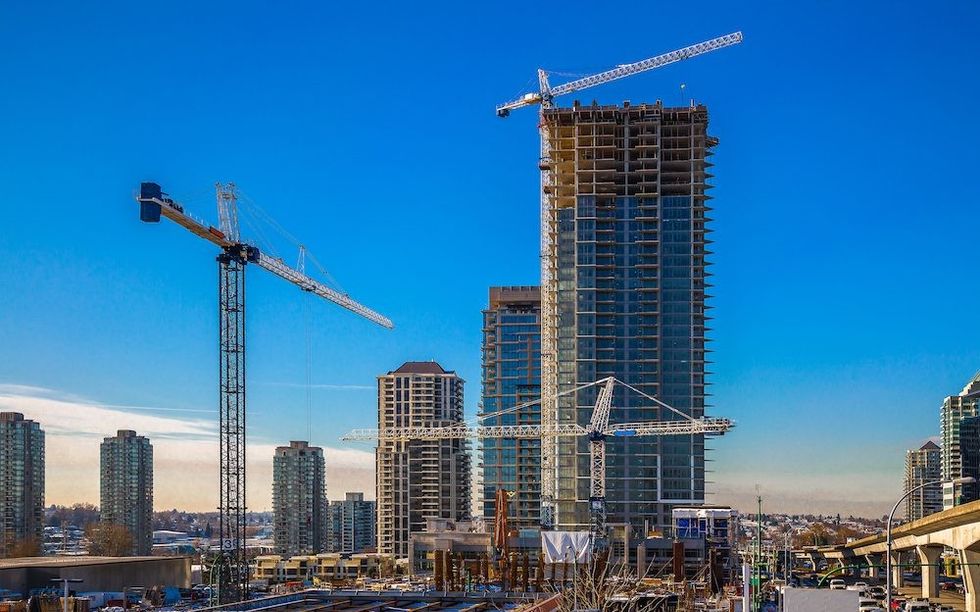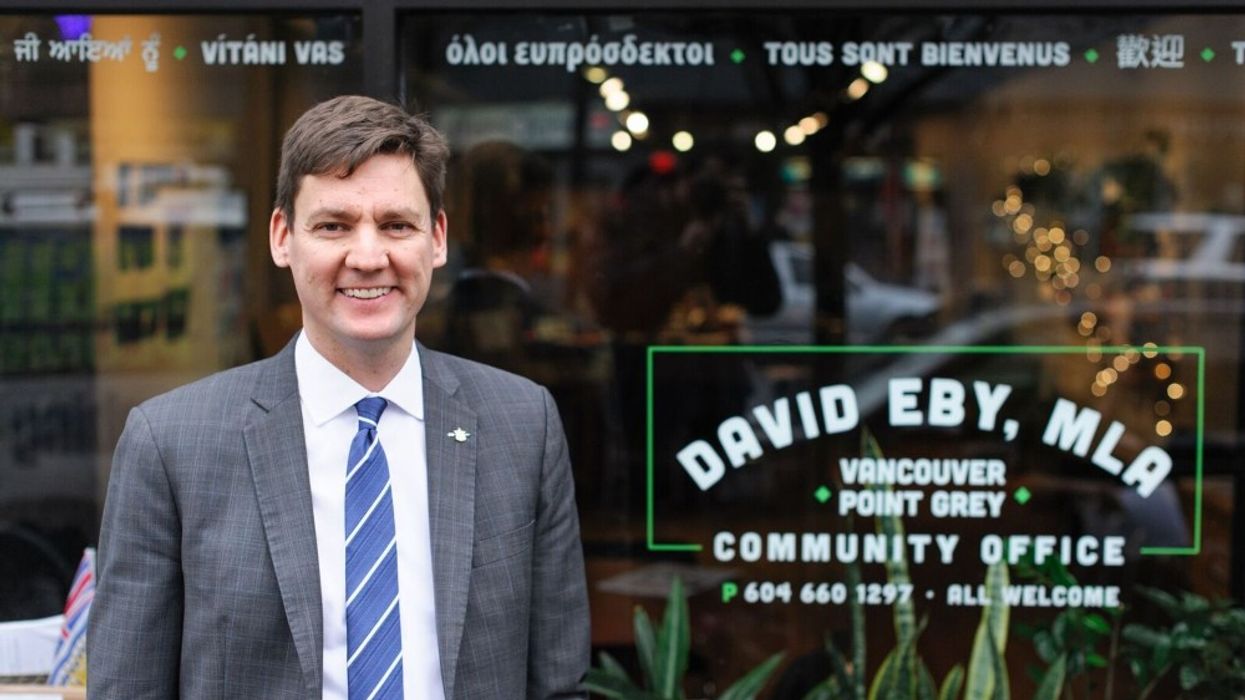David Eby unveiled his housing plan on Wednesday, saying it's a "comprehensive strategy" that includes "bold new housing solutions" -- and it is indeed comprehensive.
In his housing plan, David Eby addressed all the expected aspects of the housing crisis, such as homelessness, the housing supply shortage, and laws that have gotten in the way of alleviating those issues.
Additionally, Eby also announced that he would, if successful in his campaign, create several new programs to increase the government's involvement in the housing crisis, while also implementing new tools to push back against corporations and individuals who are taking advantage of the housing crisis to make a profit.
Homelessness and Affordability
On homelessness, Eby says that "the most acute symptom of the housing affordability crisis is that despite BC’s prosperity too many are unhoused without adequate shelter and support." To address that, Eby said he would:
- Double BC’s capital grants for non-profits to allow shovel-ready projects in high-need communities with supportive Indigenous or local governments to build more housing to respond to homelessness, immediately;
- Increase the Indigenous Housing Fund and engage further First Nations and Indigenous led housing groups to fund, build, and/or support housing for Indigenous people both in and away from traditional communities; and
- Increase staff supports and services for people living in supportive housing including culturally appropriate programming, treatment, and care for residents, while continuing to build out complex care.
READ: Here’s How BC Residents Feel About Various Ways To Reduce Homelessness
He also highlighted that the province doesn't have enough homes to accommodate its population growth and those that are available are increasingly unattainable for middle-class families and individuals. "We must secure affordable housing by partnering with the non-profit sector and safeguard it for the long term," he said.
To that tune, Eby said he would create a Rental Housing Acquisition Fund that would provide $500M for non-profits to purchase affordable rental buildings in order to protect them from displacement. He said the initial $500M will "jumpstart" the program, before rents from the acquired buildings continue to go back to the program. Eby said he would also create a new program called BC Builds, a "housing development initiative" that would:
- Work with First Nation and city governments, and private and non-profit partners, in both urban and rural areas to offer rapid approvals, increased density, land, and construction financing to deliver multi-family housing developments that can offer attainable middle class housing for a range of incomes, both rental and purchase;
- [Use] tools like upzoning select parcels in participating partner municipalities, in combination with government’s favourable lending rates, and matched with expedited approvals -- and for some projects public land -- [which] will result in significant savings directed to further reduce the costs of housing for the people living in those units.
These units, Eby said, would be accessible to those with eligibility determined by municipalities and their respective priorities. He also said he would review all of the provincially-owned land and assets to assess whether they can be used to building affordable housing, and emphasized that affordability "must be built-in" to all projects, whether it's through structures like co-op, community land trusts, or shared-equity partnerships.

Pushing Back Against Profiteers
Eby pointed out that existing affordable rental buildings are often being acquired by corporations and that he would establish a law that would provide "a right of first refusal" to stop that. Previously, existing rental buildings have been acquired and then demolished as part of large-scale developments such as SkyTrain expansion projects, but while those projects often included developing affordable housing, they often ended up being more expensive than the existing units, primarily because of being new and the newfound appeal of the area.
READ: Do SkyTrain Expansions Really Better Vancouver’s Affordable Housing Problem?
To further push back against institutional investors, Eby said his government would target those who are profiting from the housing crisis through short-term flipping. He says those methods have "spurred speculative demand and excessive price growth, making homes more expensive for regular British Columbians." To do that, he would create a new tax directed at these investors, called the BC Flipping Tax, which will:
- Apply on the sale of a residential property;
- [Go] down to zero the longer the property is held. The tax will be highest for those who hold properties for the shortest period of time, and phases out after two years;
- Include exemptions for life circumstances due to, for example, death, employment loss, divorce, or disability. Builders will also be exempted to encourage housing construction;
Eby outlined that such a tax would be determined by data and that significant notice would be provided in advance of implementation to allow investors to sell their properties beforehand and that revenue generated from this tax would go towards things like the aforementioned BC Builds program.
Among other things, Eby said "large corporations and wealthy investors are using loopholes to avoid paying their fair share", which "drives up the housing costs for everyday people." To target these "frauds, cheats, and criminals", Eby said he would create a new enforcement tool that would allow investigations into suspicious real estate transactions, as recommended in the June 2022 Cullen Commission report on money laundering in BC.
He said suspected purchasers would be forced to detail the source of the money behind the transactions and that assets that are seized would be used to fund public programs. Eby said he would also close loopholes such as the use of "bare trusts" to avoid taxes, and establish a new task force to identify people who declare poverty-level incomes but buy multi-million dollar homes.
READ: As Vancouver Development Risk Grows, More Institutional Investors Are Stepping In
Reducing Unnecessary Red-Tape
David Eby also said that the province's laws should reflect the severity of the housing crisis and that his plan would change the ones that are "preventing homes from being made available, or resulting in lengthy and unhelpful approvals processes." Such changes would include:
- Homebuilders in major urban centers will be allowed to replace a single family home with up to three units on the same footprint, as long as they are consistent with existing setbacks and height requirements;
- Secondary suites will be made legal in every region of the province;
- Reforms to municipal approvals processes outlined in the Development Approvals Review Process report will be implemented urgently in partnership with municipalities;
- Provincial permitting for housing will be ‘one-stop’ and simplified;
- Strata restrictions on rentals will be removed, and stratas will be given the ability to appear easily at the Residential Tenancy Branch to address any health, safety or quality of life issues caused by tenant behaviour that are not addressed by the unit owner, at the cost of the unit owner;
- The 19+ age restrictions in some stratas will be abolished so that young families don’t have to move out if they have a child. Strata restrictions for ‘seniors only’ will remain in place to ensure seniors have accessible retirement communities;
- Municipalities’ ‘housing needs plans’ will be used to set minimum standards for housing delivery, with municipalities exceeding targets rewarded with additional community amenity support and those failing to hit targets supported through provincial intervention to meet growth demands; and
- Short-term rental companies will be required to provide cities and regions with information about unlicensed short-term rental units in their community, empowering them to balance the needs of accommodation for tourism and accommodation for residents that works for their local needs.
David Eby's announcement of his housing plan is the first major policy announcement of his campaign to become the next leader of the BC New Democratic Party (NDP). If successful in his campaign, Eby would become the province's next Premier, succeeding John Horgan, who announced his retirement earlier this summer, citing his health.
Eby is the NDP's MLA for Vancouver-Point Grey and also served as the Minister of Housing as well as Attorney General before he resigned from both posts this summer to run for NDP Leader. In 2013, Eby famously urged John Horgan to run for the NDP Leader position, and co-chaired his campaign.
As of now, David Eby is the frontrunner for the job, with climate activist Anjali Appadurai as the only other candidate, who has acknowledged the severity of the housing crisis but has yet to detail her housing plan. The deadline for candidate registration is Wednesday, October 19, voting official opens on Saturday, November 19, and the new leader announced on Saturday, December 3.





















